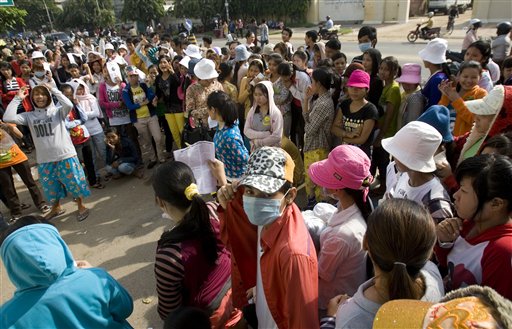
Colombia: U.S. military aid continues despite labor killings
Just as the U.S. State Department announced that Colombian progress in securing human rights justified release by Congress of $30 million in aid to the Colombian military, a new report from the CUT labor federation put the toll of murdered trade unionists so far this year at 36, 10 more than at the same time last year. CUT spokesperson Luis Alberto Vanegas indicated that five murders had occurred in Antioquia state and that 2,737 unionists have been murdered since 1986. He attributed most of the killings to paramilitary groups hired by big landowners, although over the years perpetrators have gone undiscovered in over 95 percent of the cases. Threatening pamphlets directed at union leaders are endemic throughout Colombia, he reported.
Iraq: A country of orphans
Using data from the Ministry of Labor and Social Affairs, Azzaman News claimed on September 13 that the number of orphaned children has risen from 1.5 million prior to the 2003 U.S. invasion to 5 million now. The report likened the 16 percent of orphaned Iraqis to “the equivalent of nearly 50 million U.S. orphans.” According to Islamonline.net, 600,000 children remain homeless without regular food. An anonymous Iraqi Red Crescent employee is cited testifying to the striking lack of government programs and NGO assistance for street children and orphans. Resources were apparently sufficient, however, on September 9 for the government to agree to pay $400 million toward U.S. civilians’ claims for damages incurred during the 1990 war over Kuwait.
South Africa: Agribusiness giants merge
DuPont subsidiary Pioneer Hi-Bred announced on September 15 plans to acquire Africa’s largest seed company. Purchase of the KwaZulu-Natal-based Pannar Corporation will allow Pioneer to “expand the company’s footprint in sub-Saharan Africa,” the Wall Street Journal reported. Eying sub-Saharan Africa’s 75 million acres of land available for corn and soybean cultivation, DuPont agricultural division Vice President Jim Borel has encouraged investors in the United Arab Emirates, Qatar and Kuwait to fund agricultural infrastructure projects in Africa. The report on Farmlandgrag.org indicates also that Gulf states have already purchased large tracts of arable land in the region. The stage for industrial agriculture was set, claims IPS, when governments complied with neo-liberal structural adjustment strictures by emphasizing cash crops rather than production for local markets.
Cambodia: Garment workers fight for living wage
A four-day walkout by mostly women garment workers ended September 16 with manufacturers agreeing to negotiate on wages, overtime pay, and incentives. Strikers, estimated variously at 50,000 to 200,000, were demanding a $93 monthly minimum wage, having rejected a joint industry-government offer of $61 per month. Inflation has devastated workers’ salaries, while the global economic crisis recently finished off 70,000 industry jobs. As the prime source of foreign currency, the garment sector is crucial to Cambodia’s economic survival. In preparation for the strike, workers amassed food, water, and supplies. The strike, involving workers at exporting and subcontracting factories alike, unfolded within a regional context, observed the Los Angeles Times, referring to recent strikes in Vietnam, Bangladesh and China.
Romania: Health system flounders
The recent burning deaths of five newborns at the Brasov Children’s Hospital have drawn attention to a health system characterized by severe staffing shortages, malfunctioning equipment, and exodus of physician specialists. Health care funding remains below 4 percent of the GDP with hospitals handicapped by high debt loads. Governmental subsidies for patients’ medications and hospital supplies fall far short of needs. For 20 years, state-sponsored care has co-existed with private clinics, although fewer than 400,000 Romanians have private insurance. Inter Press Service reports the government will soon be imposing copayments in order to reduce health care spending. Patient advocates warn that rising costs and hospitals closed through decentralization strategies will put care out of reach for many, especially the chronically ill.
Cuba: Health care outreach to Syria
Agreements signed in mid September by Syrian Health Minister Rida Adnan and Cuban Science and Technology Minister Jose Miyar Barruecos opened up access for Syria to a variety of Cuban pharmaceutical products. They include an anti-cancer vaccine and drugs along with sophisticated technology aimed at creating a center for producing therapeutic human placenta derivatives. Syria will also gain materials and advice enabling health workers to employ monoclonal antibodies in diagnostic testing. Additionally, the Middle Eastern nation will be availing itself of Cuban specialists’ experience demonstrated throughout Latin America and the Caribbean in assessing the health needs of people with disabilities. Miyar Barruecos, quoted by Cubadebate, characterized the accords as a “transcendent step toward an integrated future.”
Photo: Striking Cambodian garment workers rally in front of a factory on the outskirts of Phnom Penh, Cambodia, Sept. 13. (AP/Heng Sinith)

MOST POPULAR TODAY


Zionist organizations leading campaign to stop ceasefire resolutions in D.C. area

High Court essentially bans demonstrations, freedom of assembly in Deep South

Afghanistan’s socialist years: The promising future killed off by U.S. imperialism

Communist Karol Cariola elected president of Chile’s legislature






Comments